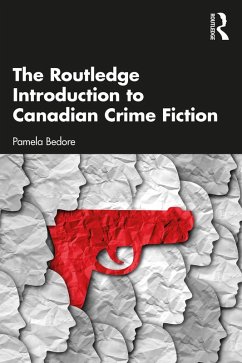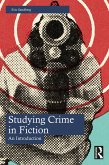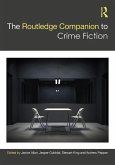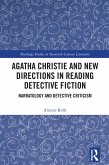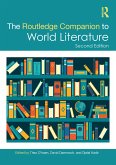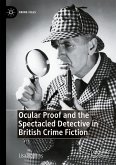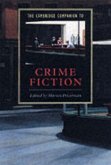Pamela Bedore
The Routledge Introduction to Canadian Crime Fiction (eBook, PDF)
42,95 €
42,95 €
inkl. MwSt.
Sofort per Download lieferbar

21 °P sammeln
42,95 €
Als Download kaufen

42,95 €
inkl. MwSt.
Sofort per Download lieferbar

21 °P sammeln
Jetzt verschenken
Alle Infos zum eBook verschenken
42,95 €
inkl. MwSt.
Sofort per Download lieferbar
Alle Infos zum eBook verschenken

21 °P sammeln
Pamela Bedore
The Routledge Introduction to Canadian Crime Fiction (eBook, PDF)
- Format: PDF
- Merkliste
- Auf die Merkliste
- Bewerten Bewerten
- Teilen
- Produkt teilen
- Produkterinnerung
- Produkterinnerung

Bitte loggen Sie sich zunächst in Ihr Kundenkonto ein oder registrieren Sie sich bei
bücher.de, um das eBook-Abo tolino select nutzen zu können.
Hier können Sie sich einloggen
Hier können Sie sich einloggen
Sie sind bereits eingeloggt. Klicken Sie auf 2. tolino select Abo, um fortzufahren.

Bitte loggen Sie sich zunächst in Ihr Kundenkonto ein oder registrieren Sie sich bei bücher.de, um das eBook-Abo tolino select nutzen zu können.
The Routledge Introduction to Canadian Crime Fiction provides a much-needed investigation into how crime and detection have been, are, and will be represented within Canada's national literature, with an attention to contemporary popular and literary texts.
- Geräte: PC
- mit Kopierschutz
- eBook Hilfe
Andere Kunden interessierten sich auch für
![Studying Crime in Fiction (eBook, PDF) Studying Crime in Fiction (eBook, PDF)]() Eric SandbergStudying Crime in Fiction (eBook, PDF)37,95 €
Eric SandbergStudying Crime in Fiction (eBook, PDF)37,95 €![The Routledge Companion to Crime Fiction (eBook, PDF) The Routledge Companion to Crime Fiction (eBook, PDF)]() The Routledge Companion to Crime Fiction (eBook, PDF)47,95 €
The Routledge Companion to Crime Fiction (eBook, PDF)47,95 €![Agatha Christie and New Directions in Reading Detective Fiction (eBook, PDF) Agatha Christie and New Directions in Reading Detective Fiction (eBook, PDF)]() Alistair RollsAgatha Christie and New Directions in Reading Detective Fiction (eBook, PDF)42,95 €
Alistair RollsAgatha Christie and New Directions in Reading Detective Fiction (eBook, PDF)42,95 €![Nazi Germany and the Holocaust in Historical Crime Fiction (eBook, PDF) Nazi Germany and the Holocaust in Historical Crime Fiction (eBook, PDF)]() Anthony LakeNazi Germany and the Holocaust in Historical Crime Fiction (eBook, PDF)42,95 €
Anthony LakeNazi Germany and the Holocaust in Historical Crime Fiction (eBook, PDF)42,95 €![The Routledge Companion to World Literature (eBook, PDF) The Routledge Companion to World Literature (eBook, PDF)]() The Routledge Companion to World Literature (eBook, PDF)46,95 €
The Routledge Companion to World Literature (eBook, PDF)46,95 €![Ocular Proof and the Spectacled Detective in British Crime Fiction (eBook, PDF) Ocular Proof and the Spectacled Detective in British Crime Fiction (eBook, PDF)]() Lisa HopkinsOcular Proof and the Spectacled Detective in British Crime Fiction (eBook, PDF)97,95 €
Lisa HopkinsOcular Proof and the Spectacled Detective in British Crime Fiction (eBook, PDF)97,95 €![Cambridge Companion to Crime Fiction (eBook, PDF) Cambridge Companion to Crime Fiction (eBook, PDF)]() Cambridge Companion to Crime Fiction (eBook, PDF)25,95 €
Cambridge Companion to Crime Fiction (eBook, PDF)25,95 €-
-
-
The Routledge Introduction to Canadian Crime Fiction provides a much-needed investigation into how crime and detection have been, are, and will be represented within Canada's national literature, with an attention to contemporary popular and literary texts.
Dieser Download kann aus rechtlichen Gründen nur mit Rechnungsadresse in A, B, BG, CY, CZ, D, DK, EW, E, FIN, F, GR, HR, H, IRL, I, LT, L, LR, M, NL, PL, P, R, S, SLO, SK ausgeliefert werden.
Produktdetails
- Produktdetails
- Verlag: Taylor & Francis eBooks
- Seitenzahl: 288
- Erscheinungstermin: 27. Februar 2024
- Englisch
- ISBN-13: 9781003852551
- Artikelnr.: 69690582
- Verlag: Taylor & Francis eBooks
- Seitenzahl: 288
- Erscheinungstermin: 27. Februar 2024
- Englisch
- ISBN-13: 9781003852551
- Artikelnr.: 69690582
- Herstellerkennzeichnung Die Herstellerinformationen sind derzeit nicht verfügbar.
Pamela Bedore is Associate Professor of English at the University of Connecticut, where she teaches courses in American Literature and Popular Culture. She holds BA and BEd degrees from Queen's University, an MA in English from Simon Fraser University, and a PhD in American Literature from the University of Rochester. She has published widely on detective fiction and speculative fiction, including the monograph Dime Novels and the Roots of American Detective Fiction (2013) and the lecture series Great Utopian and Dystopian Works of Literature (The Great Courses, 2017). Pam was the book review editor for Clues: A Journal of Detection for ten years and was recently a visiting scholar at an NEH Summer Institute on Climate Futurism.
Chapter 1. Negotiations of National Identity in Canadian Crime Fiction
Part 1: Historical Confrontations
Chapter 2. John McFetridge and the Legacy of French/English Tensions
Chapter 3. Giles Blunt and the Canadian North
Chapter 4. Thomas King and the Liminal Indigenous Detective
Chapter 5. Ausma Zehanat Khan and Multiculturalism in Canada
Chapter 6: Linwood Barclay and the American Dream
Part 2: Canadian Genre Play
Chapter 7. The Police Procedural: Registering Change with Peter Robinson's
DCI Banks
Chapter 8. The Amateur Detective: Gail Bowen's Joanne Kilbourn as Canadian
Revisionist
Chapter 9. The Gay Private Eye: Anthony Bidulka's Russell Quant
Chapter 10. The Legal Thriller: Trauma and Resilience in Pamela Callow's
Kate Lange
Chapter 11. The Postmodern Detective: Literary Detection in Timothy Findley
and Carol Shields
Part 3: Futuristic Explorations
Chapter 12. Louise Penny's Cozy Exploration of Trauma and Temporality in
the Anthropocene
Chapter 13. Storytelling, Guilt, and Games in Margaret Atwood's
Postapocalyptic Crime Fiction
Chapter 14. Interpretive Mysteries and Impossible Crimes in Emily St. John
Mandel's Speculative Fiction
Part 1: Historical Confrontations
Chapter 2. John McFetridge and the Legacy of French/English Tensions
Chapter 3. Giles Blunt and the Canadian North
Chapter 4. Thomas King and the Liminal Indigenous Detective
Chapter 5. Ausma Zehanat Khan and Multiculturalism in Canada
Chapter 6: Linwood Barclay and the American Dream
Part 2: Canadian Genre Play
Chapter 7. The Police Procedural: Registering Change with Peter Robinson's
DCI Banks
Chapter 8. The Amateur Detective: Gail Bowen's Joanne Kilbourn as Canadian
Revisionist
Chapter 9. The Gay Private Eye: Anthony Bidulka's Russell Quant
Chapter 10. The Legal Thriller: Trauma and Resilience in Pamela Callow's
Kate Lange
Chapter 11. The Postmodern Detective: Literary Detection in Timothy Findley
and Carol Shields
Part 3: Futuristic Explorations
Chapter 12. Louise Penny's Cozy Exploration of Trauma and Temporality in
the Anthropocene
Chapter 13. Storytelling, Guilt, and Games in Margaret Atwood's
Postapocalyptic Crime Fiction
Chapter 14. Interpretive Mysteries and Impossible Crimes in Emily St. John
Mandel's Speculative Fiction
Chapter 1. Negotiations of National Identity in Canadian Crime Fiction
Part 1: Historical Confrontations
Chapter 2. John McFetridge and the Legacy of French/English Tensions
Chapter 3. Giles Blunt and the Canadian North
Chapter 4. Thomas King and the Liminal Indigenous Detective
Chapter 5. Ausma Zehanat Khan and Multiculturalism in Canada
Chapter 6: Linwood Barclay and the American Dream
Part 2: Canadian Genre Play
Chapter 7. The Police Procedural: Registering Change with Peter Robinson's DCI Banks
Chapter 8. The Amateur Detective: Gail Bowen's Joanne Kilbourn as Canadian Revisionist
Chapter 9. The Gay Private Eye: Anthony Bidulka's Russell Quant
Chapter 10. The Legal Thriller: Trauma and Resilience in Pamela Callow's Kate Lange
Chapter 11. The Postmodern Detective: Literary Detection in Timothy Findley and Carol Shields
Part 3: Futuristic Explorations
Chapter 12. Louise Penny's Cozy Exploration of Trauma and Temporality in the Anthropocene
Chapter 13. Storytelling, Guilt, and Games in Margaret Atwood's Postapocalyptic Crime Fiction
Chapter 14. Interpretive Mysteries and Impossible Crimes in Emily St. John Mandel's Speculative Fiction
Part 1: Historical Confrontations
Chapter 2. John McFetridge and the Legacy of French/English Tensions
Chapter 3. Giles Blunt and the Canadian North
Chapter 4. Thomas King and the Liminal Indigenous Detective
Chapter 5. Ausma Zehanat Khan and Multiculturalism in Canada
Chapter 6: Linwood Barclay and the American Dream
Part 2: Canadian Genre Play
Chapter 7. The Police Procedural: Registering Change with Peter Robinson's DCI Banks
Chapter 8. The Amateur Detective: Gail Bowen's Joanne Kilbourn as Canadian Revisionist
Chapter 9. The Gay Private Eye: Anthony Bidulka's Russell Quant
Chapter 10. The Legal Thriller: Trauma and Resilience in Pamela Callow's Kate Lange
Chapter 11. The Postmodern Detective: Literary Detection in Timothy Findley and Carol Shields
Part 3: Futuristic Explorations
Chapter 12. Louise Penny's Cozy Exploration of Trauma and Temporality in the Anthropocene
Chapter 13. Storytelling, Guilt, and Games in Margaret Atwood's Postapocalyptic Crime Fiction
Chapter 14. Interpretive Mysteries and Impossible Crimes in Emily St. John Mandel's Speculative Fiction
Chapter 1. Negotiations of National Identity in Canadian Crime Fiction
Part 1: Historical Confrontations
Chapter 2. John McFetridge and the Legacy of French/English Tensions
Chapter 3. Giles Blunt and the Canadian North
Chapter 4. Thomas King and the Liminal Indigenous Detective
Chapter 5. Ausma Zehanat Khan and Multiculturalism in Canada
Chapter 6: Linwood Barclay and the American Dream
Part 2: Canadian Genre Play
Chapter 7. The Police Procedural: Registering Change with Peter Robinson's
DCI Banks
Chapter 8. The Amateur Detective: Gail Bowen's Joanne Kilbourn as Canadian
Revisionist
Chapter 9. The Gay Private Eye: Anthony Bidulka's Russell Quant
Chapter 10. The Legal Thriller: Trauma and Resilience in Pamela Callow's
Kate Lange
Chapter 11. The Postmodern Detective: Literary Detection in Timothy Findley
and Carol Shields
Part 3: Futuristic Explorations
Chapter 12. Louise Penny's Cozy Exploration of Trauma and Temporality in
the Anthropocene
Chapter 13. Storytelling, Guilt, and Games in Margaret Atwood's
Postapocalyptic Crime Fiction
Chapter 14. Interpretive Mysteries and Impossible Crimes in Emily St. John
Mandel's Speculative Fiction
Part 1: Historical Confrontations
Chapter 2. John McFetridge and the Legacy of French/English Tensions
Chapter 3. Giles Blunt and the Canadian North
Chapter 4. Thomas King and the Liminal Indigenous Detective
Chapter 5. Ausma Zehanat Khan and Multiculturalism in Canada
Chapter 6: Linwood Barclay and the American Dream
Part 2: Canadian Genre Play
Chapter 7. The Police Procedural: Registering Change with Peter Robinson's
DCI Banks
Chapter 8. The Amateur Detective: Gail Bowen's Joanne Kilbourn as Canadian
Revisionist
Chapter 9. The Gay Private Eye: Anthony Bidulka's Russell Quant
Chapter 10. The Legal Thriller: Trauma and Resilience in Pamela Callow's
Kate Lange
Chapter 11. The Postmodern Detective: Literary Detection in Timothy Findley
and Carol Shields
Part 3: Futuristic Explorations
Chapter 12. Louise Penny's Cozy Exploration of Trauma and Temporality in
the Anthropocene
Chapter 13. Storytelling, Guilt, and Games in Margaret Atwood's
Postapocalyptic Crime Fiction
Chapter 14. Interpretive Mysteries and Impossible Crimes in Emily St. John
Mandel's Speculative Fiction
Chapter 1. Negotiations of National Identity in Canadian Crime Fiction
Part 1: Historical Confrontations
Chapter 2. John McFetridge and the Legacy of French/English Tensions
Chapter 3. Giles Blunt and the Canadian North
Chapter 4. Thomas King and the Liminal Indigenous Detective
Chapter 5. Ausma Zehanat Khan and Multiculturalism in Canada
Chapter 6: Linwood Barclay and the American Dream
Part 2: Canadian Genre Play
Chapter 7. The Police Procedural: Registering Change with Peter Robinson's DCI Banks
Chapter 8. The Amateur Detective: Gail Bowen's Joanne Kilbourn as Canadian Revisionist
Chapter 9. The Gay Private Eye: Anthony Bidulka's Russell Quant
Chapter 10. The Legal Thriller: Trauma and Resilience in Pamela Callow's Kate Lange
Chapter 11. The Postmodern Detective: Literary Detection in Timothy Findley and Carol Shields
Part 3: Futuristic Explorations
Chapter 12. Louise Penny's Cozy Exploration of Trauma and Temporality in the Anthropocene
Chapter 13. Storytelling, Guilt, and Games in Margaret Atwood's Postapocalyptic Crime Fiction
Chapter 14. Interpretive Mysteries and Impossible Crimes in Emily St. John Mandel's Speculative Fiction
Part 1: Historical Confrontations
Chapter 2. John McFetridge and the Legacy of French/English Tensions
Chapter 3. Giles Blunt and the Canadian North
Chapter 4. Thomas King and the Liminal Indigenous Detective
Chapter 5. Ausma Zehanat Khan and Multiculturalism in Canada
Chapter 6: Linwood Barclay and the American Dream
Part 2: Canadian Genre Play
Chapter 7. The Police Procedural: Registering Change with Peter Robinson's DCI Banks
Chapter 8. The Amateur Detective: Gail Bowen's Joanne Kilbourn as Canadian Revisionist
Chapter 9. The Gay Private Eye: Anthony Bidulka's Russell Quant
Chapter 10. The Legal Thriller: Trauma and Resilience in Pamela Callow's Kate Lange
Chapter 11. The Postmodern Detective: Literary Detection in Timothy Findley and Carol Shields
Part 3: Futuristic Explorations
Chapter 12. Louise Penny's Cozy Exploration of Trauma and Temporality in the Anthropocene
Chapter 13. Storytelling, Guilt, and Games in Margaret Atwood's Postapocalyptic Crime Fiction
Chapter 14. Interpretive Mysteries and Impossible Crimes in Emily St. John Mandel's Speculative Fiction
